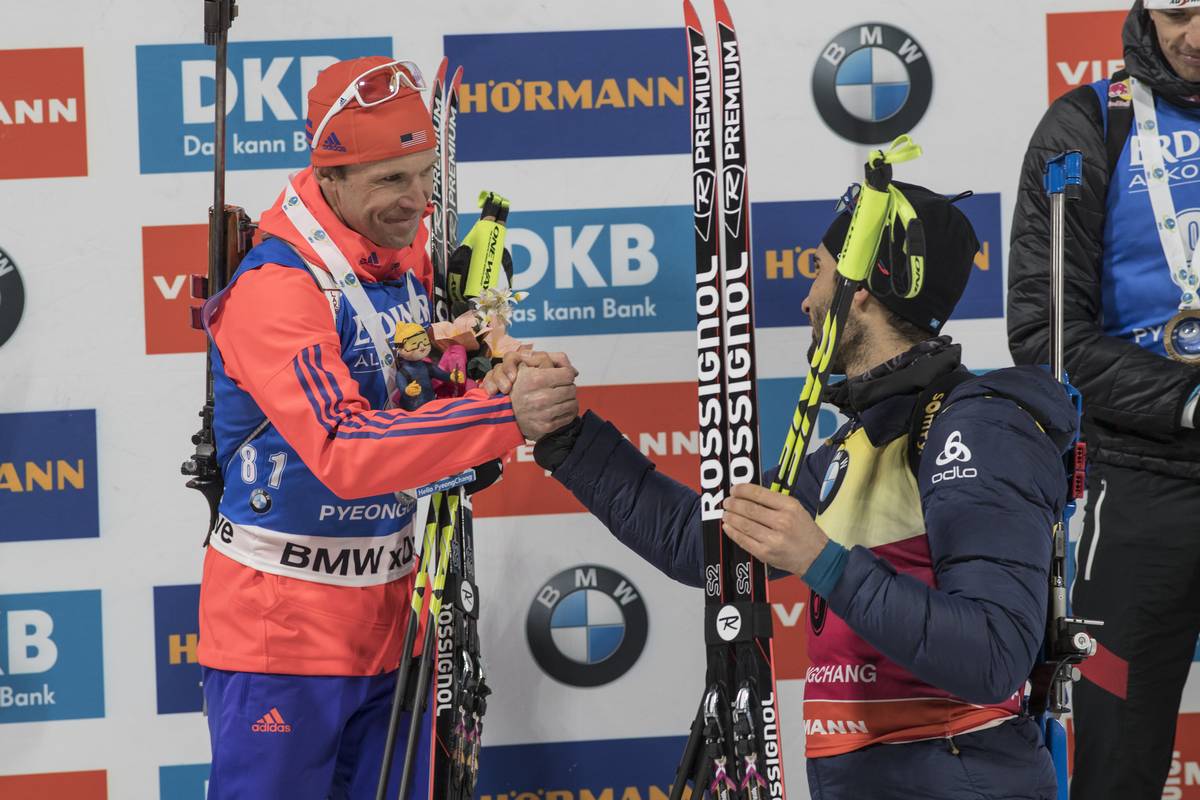
A screenwriter for a Hollywood thriller hardly could have written a more suspenseful albeit a little convoluted race dramaturgy: Whenever you thought, ‘All right, this has to be it,’ and ‘It’s over now,’ another corkscrew plot twist happened and a new hero emerged.
And one of those heroes was US Biathlon’s Lowell Bailey. But at the end of the day he wasn’t the last man standing at the top.
A year ahead of the 2018 Olympic Winter Games in PyeongChang, South Korea, the International Biathlon Union (IBU) World Cup is testing the redesigned venue, and on Friday the men’s 10-kilometer sprint was on the schedule.
With most of the favorites opting for late start groups, the athletes in contention after the two shooting stages and intermittently taking the lead in the finish kept on changing. First there was Italy’s Dominik Windisch. Then, starting only two positions later, Austria’s Dominik Landertinger immediately replaced the Italian. After a while Landertinger’s teammate Simon Eder became a challenger until he missed two shots in standing, and Ukraine’s Artem Pryma shot clean but skied slower. Then Germany’s Erik Lesser looked like a potential winner before missing his final shot, and came within seconds of Landertinger’s time with a fast last loop. Finally, France’s Martin Fourcade bested Landertinger’s time despite two penalties by skiing the fastest course time of the day overall and on the final loop.
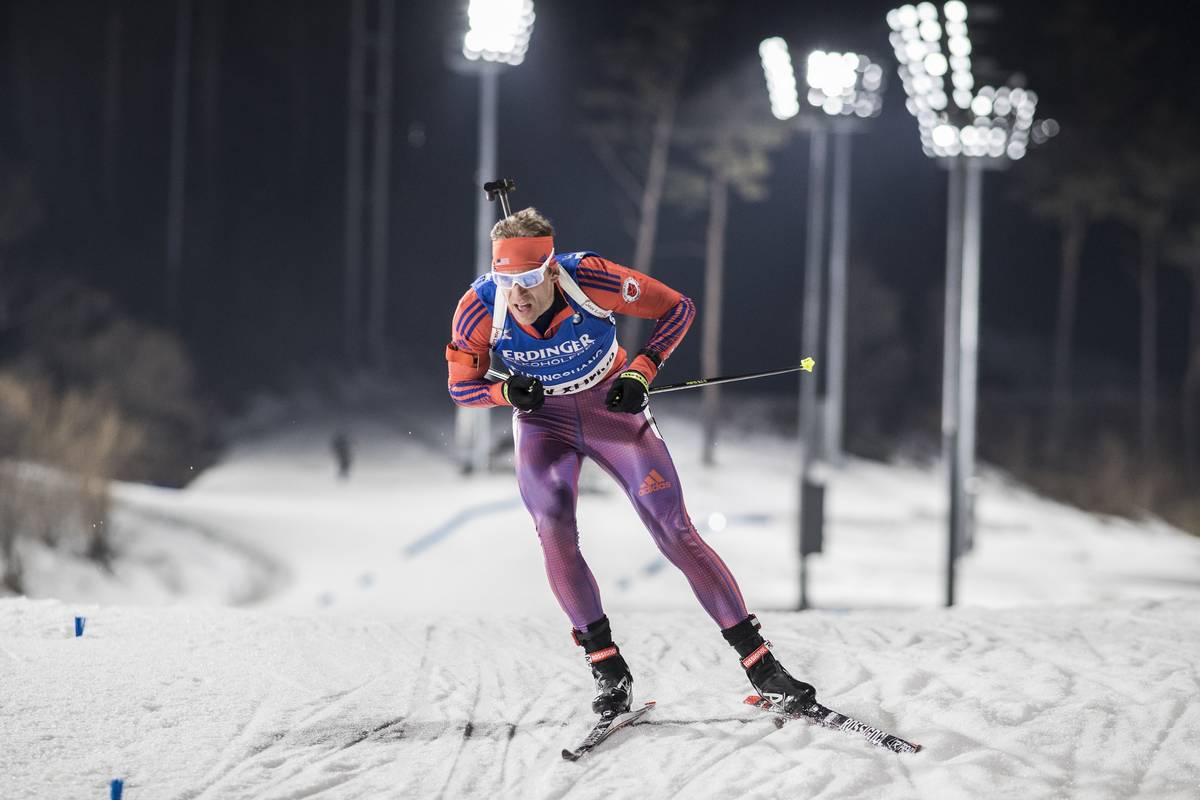
And then along came Bailey, starting five positions behind Fourcade in bib 81. Bailey kept his recent clean shooting streak alive and managed to take the lead, leaving the range for the last time with a 15-second lead, and 33 seconds to Fourcade who had come back on the course even farther behind.
On the last loop, Bailey’s lead began to shrink precariously but he preserved a few seconds, even increasing it again on the last few hundred meters to finish 4.7 seconds faster than Fourcade.
‘Ding-Dong! The witch is dead!’ viewers partial to Bailey and remembering the classic movie ‘The Wizard of Oz’ might have thought at this point. But was it undeniably and reliably dead? For a few minutes it seemed like another perfect, happy movie ending awaited Bailey. But this time maybe it rather was a slasher movie with a villain who just doesn’t seem to die.
If this race had been the movie ‘The Shining’, Bailey was coming to save the day like Scatman Crothers’s supernaturally-gifted character Hallorann driving through a snowstorm to save the little boy Danny, and only minutes after he arrives back in the ominous Overlook Hotel suddenly WHACK! Jack Nicholson’s character kills him with an axe.

That must be a little bit how Bailey felt when he had managed to stay ahead of the usually dominant Fourcade, mobilizing his last energy reserves, but then had to look on as Austria’s Julian Eberhard emerged as the next athlete to shoot clean and skied even faster. A lot faster. After the final standing shooting he had a 20.6-second lead, and on the last loop he increased that to 40.7 seconds when he crossed the line with a winning time of 23:11.1 minutes.
Bailey could be seen on the TV broadcast mouthing what looked like, “Wow,” when he saw the time difference.
“I’m happy with the way things went,” Bailey later told FasterSkier on the phone. “Eberhard had an incredible race and he’s just such an amazing skier that he’s pretty darn hard to beat when he shoots clean.”
With the second place, Bailey tied the best World Cup sprint result of his career, after also finishing on that position in Kontiolahti, Finland, during the 2013/2014 season. For Eberhard, it was the third World Cup victory of his career and his second one of the season, all in sprints.
“Conditions were very difficult today, and I already feared I had made a mistake with my start group pick,“ Eberhard said in an interview with Austrian TV broadcaster ORF. “But I just said to myself, ‘So what? Just go full throttle and make a good race.’ From the first meter to the finish, everything just worked out perfectly. … Of course I am very happy and overjoyed.”
Eberhard added at the post-race press conference that winning a medal in the men’s relay at the IBU World Championships at home in Hochfilzen, Austria, made things easier for him and his teammates.
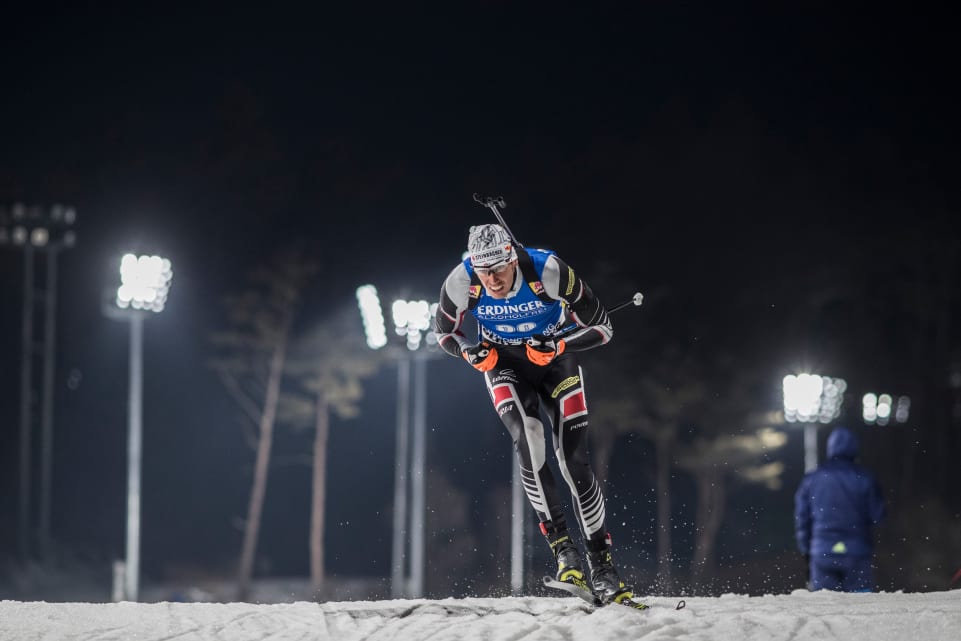
“The World Championships were much pressure for us, so when I came here I just thought, ‘I feel much more free than the last weeks,’… I am really satisfied with this competition today. I love these tracks, and even the shooting range.”
Similarly, Bailey felt his consistent performances including a career-best gold medal in the 20 k individual race at IBU World Championships two weeks ago also boosted his confidence.
“Sometimes you have these waves as an athlete, sometimes you can have also the opposite,” Bailey said at the press conference. “I have been on this path since World Championships. I feel good physically and mentally, and confident on the shooting range and on the tracks. I am really happy with this race. I didn’t really know what to expect, and just told myself to go out and do the best that I can.”
Fourcade in third place, 45.4 seconds behind Eberhard, was the only athlete who managed to reach the podium despite a penalty, after incurring one in each shooting stage (1+1). He was also the only athlete in the top seven with two misses.
“My prone was quite good. But my standing is so disappointing,” Fourcade said at the press conference. “I did 99 percent of the job, and forgot to do the 1 percent left. It’s only my fault if I miss it, and I can only blame myself. But it will not change the result today. Julian was so fast and shot clean. When he has that kind of day, when you want to have a chance, you also have to shoot clean.”
Lord of the Globes
Yet third place was still good news for Fourcade. With that result, the French biathlon star secured his sixth-straight overall title for the World Cup Total Score. Russia’s Anton Shipulin as the closest contender is now 360 points behind after finishing 23rd on Friday (+1:30.3 with 3 penalties), as well as Germany’s Simon Schempp, currently in third who did not make the trip to South Korea following an illness, are both mathematically unable to catch up to Fourcade in the remaining races of the season. Bailey currently sits in ninth place in the Total Score ranking.
“That’s amazing. I even didn’t realize it at the finish, I was focused on what I can do better at next year’s Olympics, but then the [French] TV team told me that I won the globe [trophy],“ Fourcade said at the press conference. “I will always remember the first time in Khanty-Mansiysk when I won my first overall total globe. I said it was too difficult, I will never fight for that again. It’s like ‘Lord of the Rings’, it’s something you have to do. It’s why I love my sport, this big crystal globe. It’s what I fight for. It means so much for me to join [Norway’s] Ole Einar Bjørndalen in this ranking. He was a [role] model when I was young, and he still is. So I am proud to be on his level winning six globes.”
Bailey’s Race Day
After spending a quiet training block in Ruhpolding, Germany, Bailey said after Friday’s race that he and his U.S. team had come to South Korea with a good feeling.

“I think we just have a really positive energy within the whole staff right now. Everyone is feeling good coming out of world champs and I think motivated to continue onto these next three weeks,” he said.
Bailey explained he had been confident after staying healthy through World Championships, and “I have been able to rely on my shooting more consistently and I’ve had good ski speed throughout the year.”
But the conditions in PyeongChang were still difficult for the experienced biathlete for the sprint, with very different wind during the ‘zeroing’ target practice than during the race.
“Prone was really challenging today,” Bailey said of his shooting experience. “The wind progressively just got stronger and stronger, so it was challenging because I had to shade different and aim differently for every shot. So I’m really happy with the way the prone went. And then I think sometimes you have a little bit of luck, so when I came into standing the wind had died down quite a bit.”
When he left the range, Bailey was about 16 seconds ahead of Ukraine’s Pryma, who had shot clean but with a slower last loop would end the day only in 10th position (+1:07.7). Fourcade starting five bibs ahead of Bailey had left the range behind his split time, but with a furious last loop would soon set the time to beat in the finish.
“As I was leaving the stadium, the jumbotron monitor showed my split so I could see that I was in first…,” Bailey recalled of the start of his final loop. “On the first hill they [my team’s staff] told me that I had 13 seconds, I think, so I just did the best I could, and if I look at my race, my best lap was probably my first lap and then I was fighting for every meter. Thankfully we had good material today, good skis. I lost some seconds at the beginning of the course but then I was able to stay even toward the back end of the course.”
Bailey said in the press conference that he had no information from his coaching staff on Eberhard while he was on the final loop.
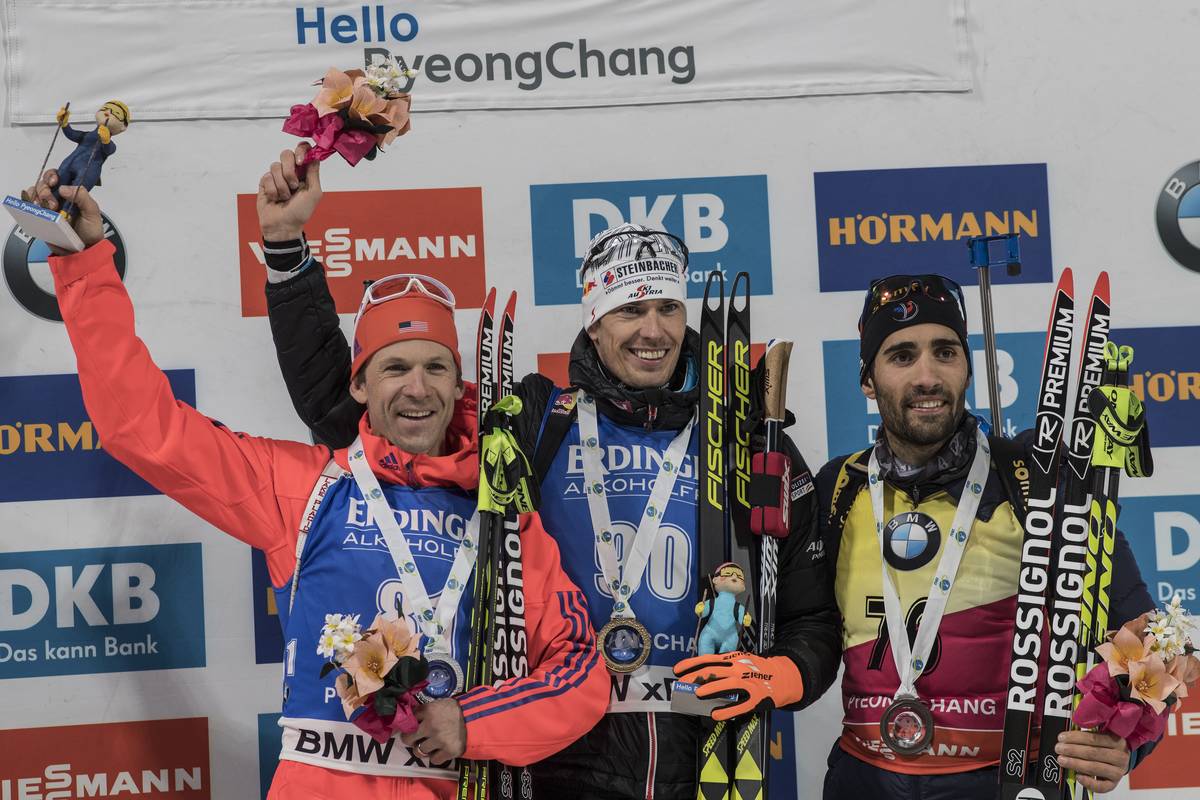
“It’s probably a good thing they didn’t tell me about Julian. All information I got was that I was in first place [over Fourcade] and that was what I was fighting for,” he said. “I am pretty sure I didn’t have 40 seconds in me. So I didn’t know about Julian. He skied an incredible race today and he has a good lead tomorrow [for the pursuit].”
On a course with bumpy tracks that looked slightly improved from the women’s sprint a day before and with only a few hundred fans in attendance, mostly making a permanent background noise with drums and other instruments instead of the excited ‘Yay!’ or disappointed ‘Owww’ comments often heard from the stands during shooting stages at European World Cups, the venue in PyeongChang still leaves some room for improvement, or at least is a little unusual race experience.
However, Bailey was satisfied with how things look one year out from the Olympics, after a redesign of the courses since the last time PyeongChang hosted an international biathlon championship eight years ago.
“They made some significant changes since 2009 World Champs,” Bailey told FasterSkier. “They’re changes that I think play to my strengths, so I’m happy with the course and this is a really challenging range, so I was ecstatic to be able to shoot clean today.
“Biathlon it’s a tough sport because there’s so many factors that go into a successful result and I just feel very fortunate that I have not only one of the best support teams in the world but also the support of my family,” Bailey continued. “They’re behind me 100 percent. I know that I can go out there and be first or last, and they still support me through all of this so that’s a big calming presence.”
In the last five non-relay races, including four at World Championships, Bailey has not placed outside the top six. And in all of those races, he has only incurred one miss.
Behind Bailey, Austria nearly had a second athlete on the podium with Landertinger finishing fourth (+48.1) after shooting clean, just 2.7 seconds behind Fourcade in third.
“The shooting was super, I really pulled through twice,” Landertinger, who was just one place short of his first individual podium finish of the season, told ORF. “But on the course it didn’t work well for me. The first loops were extremely flaccid, maybe I still felt the time difference. The final loop was better, unfortunately it just wasn’t enough for the podium. That is really sad. Maybe it will work out tomorrow.“
Germany’s Lesser finished fifth (+50.3) after missing the last shot of his competition (0+1) and having to ski through the penalty lap.
“Missing the last shot is always annoying, but I can be happy about a fifth place with one penalty,” Lesser told German broadcaster ARD. “I’d have wished for that at world champs… I’m still struggling with the travel here. On the first day I woke up at 2:30 p.m. local time and ate rice and curry for breakfast, then I tried to adapt but fell asleep only at 4 or 5 a.m. when you’d want to make breakfast. So I screwed up that adaptation.”
Also within one minute back, Italy’s Windisch placed sixth (+54.1) with one penalty in prone (1+0).
“I am really happy, the perfect start for this stage,” Windisch told the IBU in an interview. “Also for the Olympics, I feel good for next year. It was not easy, because of the wind I had tears in my eyes so I had to shoot very slow, but I am happy that I hit them.”
Three Canadians, Two Americans Qualify for Pursuit
Three Canadians finished in the top 60 to qualify for Saturday’s pursuit, with Scott Gow leading them in 27th place (+1:40.3).
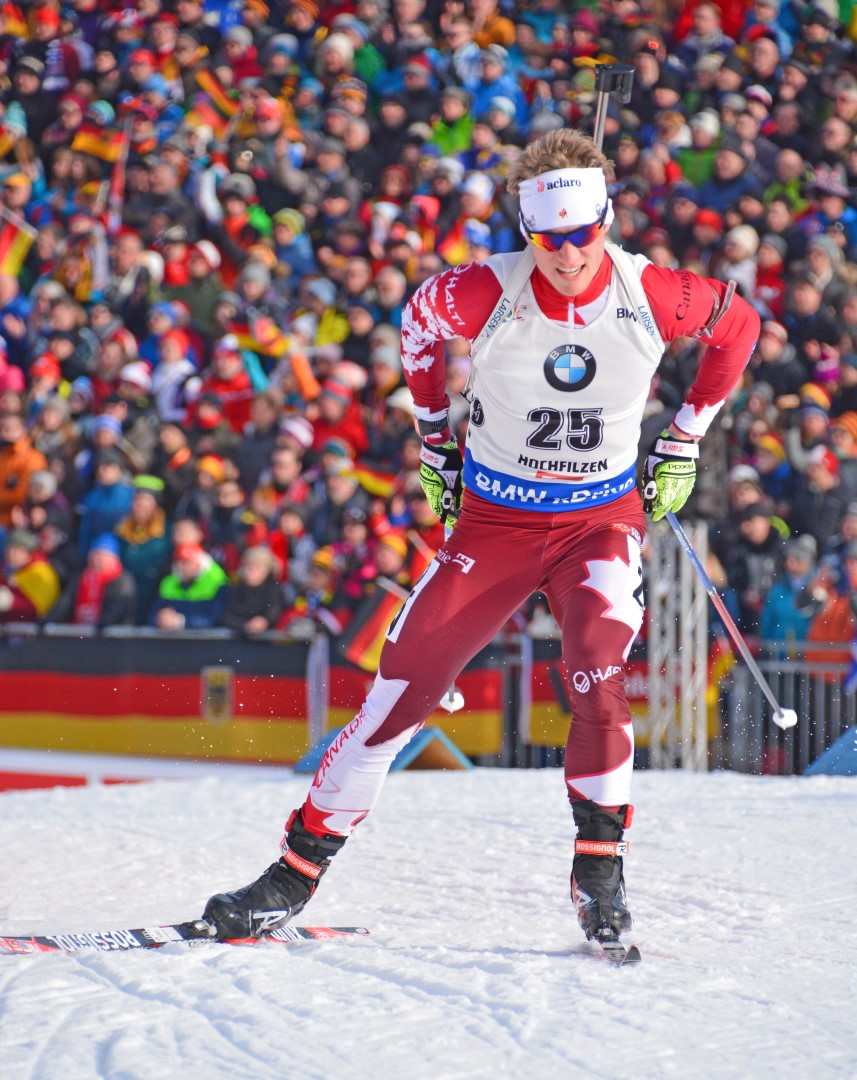
“I like PyeongChang,” Gow wrote in an email. “It’s very different being in Asia, but our accommodation is very nice and the food has been pretty good. The venue is also very good. There is a great variety of ski trails in the cross country area, but biathlon is limited to only the race trails. The race courses are very hilly and the downhills are somewhat technical, especially when it’s icy, but they are fun to race on and it’s a good challenge.”
“The shooting conditions were moderately tricky,” he reflected on his shooting stages after incurring one penalty in each (1+1). “The wind was quite high during zero and became more variable during the race. I had to correct my sights when I came into prone, and it’s hard to say if I missed because of wind or if it was because I pulled the shot. In standing I started thinking about wanting to clean and as soon as I did I threw myself off my rhythm. Frustrating mistake there, but otherwise I was pleased with how my shooting felt.”
“I really wish I had hit all my targets today, because my skiing was quite strong,” he concluded. “I was surprised to end up in the top 30, but I think a lot of poor shooting by a lot of athletes helped me.”
One position behind Gow, his teammate Brendan Green finished 28th (+1:42.1) with one miss (0+1) for his best result this season.
“My feeling so far here In Korea has been really up and down,” Green wrote in an email. “I came down with a cold just before we traveled to Korea and I think recovering from that combined with jet lag has been a bit tough on my body.
“Overall I am very happy with today’s result given how my season has been going,” he wrote of his first individual top 30 of the season. “I think what made the difference for me today was being able to execute solid shooting in what were challenging conditions. The snow conditions were also quite difficult to race in tonight but I did my best and gave it my all.”
Similar to Bailey, Green was happy to see some changes made to the course since he last raced in PyeongChang at the 2009 World Championships.
“It was my first season on the World Cup and I remember feeling really overwhelmed with the course and conditions back then,” Green wrote. “The track was terrifying and I remember a lot of wind. So far the weather and ski conditions have been similar to 2009, but they’ve made some really good changes to the tracks since then in making the course overall less aggressive and safer.
“It has been a very challenging year for me,” Green reflected on his season so far. “I am not exactly sure what went wrong, but it’s been a tough struggle since the first World Cup. It’s obvious my body did not respond well to one or more elements in my training this past year. At this point I am taking it race by race. I’ve had to stop thinking about where I typically should be performing … to only focusing on executing the best race I can on each given day, and then assessing that.”
Scott Gow’s brother Christian Gow also qualified for the pursuit in 56th (+2.33.6) with two prone penalties (2+0). Nathan Smith finished 88th (+3:32.5) with two standing misses (0+2) in his first World Cup race since early December following an illness that also kept him out of World Championships, and Macx Davies finished 98th (+4:20.2) with four penalties (3+1).
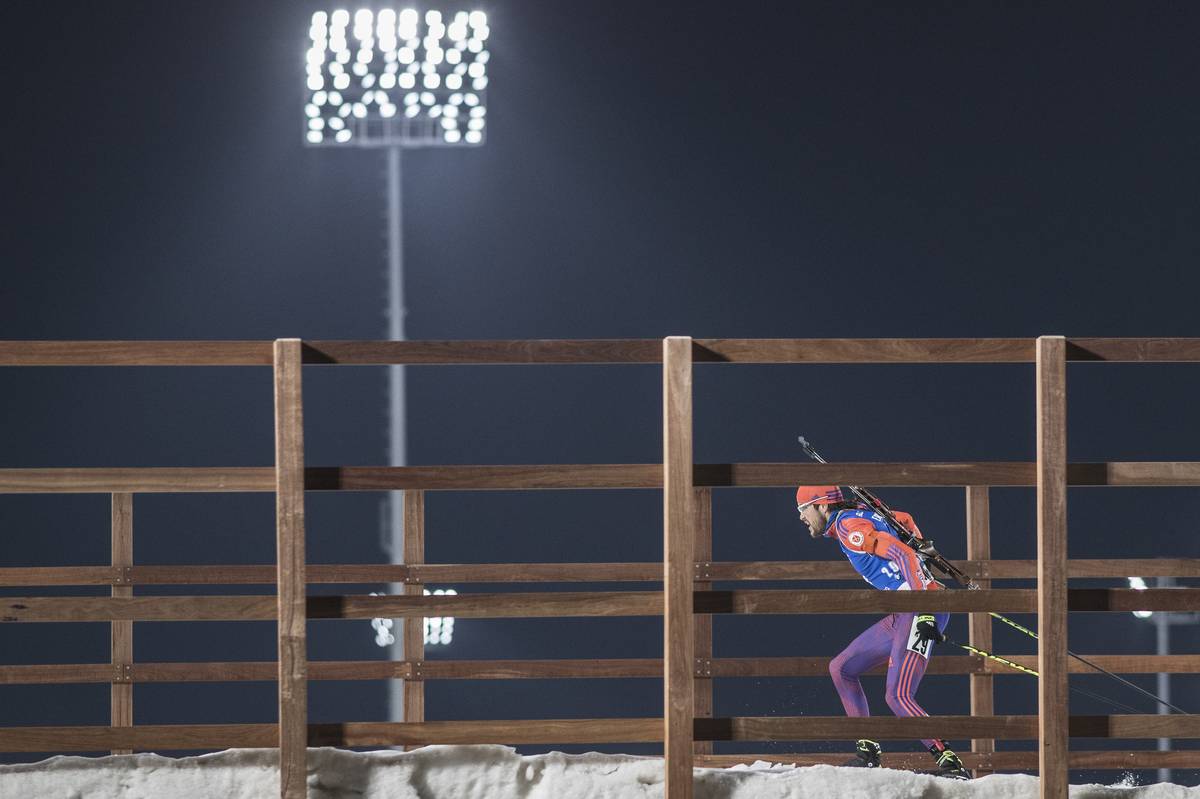
For the U.S., Leif Nordgren placed 37th (+2:03.7) with two misses (1+1) to qualify for the pursuit, along with Bailey.
“For me, the race had some ups and some downs,” Nordgren said according to a US Biathlon press release. “I was pretty happy with the way I skied and I like the tracks here so far. The conditions tonight had a little bit of everything… some very dry windblown snow, some parts of very wet, slushy snow, and some hard-packed glaze. I’m disappointed in my shooting. I missed the last shot on both prone and standing, which is by far the most annoying one to miss. I’ll have to make some adjustments to make sure that doesn’t happen in tomorrow’s pursuit.”
“It’s really nice to have him performing well,“ Nordgren said of Bailey’s successes. “It’s a great inspiration and I hope we can both capitalize tomorrow in the pursuit.“
Their teammate Sean Doherty finished 80th (+3:13.3) with two penalties (1+1), and could be seen on the broadcast almost taking a wrong track on the course at one point, having to ski back a few meters.
The fourth U.S. starter Paul Schommer, in the second World Cup race of his career, finished 101st (+4:38.1) with five misses (3+2). Mostly racing the IBU Cup and Open European Championships this season, Schommer previously achieved 33rd place in the 20 k individual at the World Cup in Antholz, Italy, in January.
Harald Zimmer
Harald has been following cross-country skiing and biathlon for some 20 years since the Olympic Winter Games in Albertville and Lillehammer. A graduate of Middlesex University London and Harvard University, he now lives near the Alps where he likes to go skiing, snowboarding and hiking. He is a former track athlete in middle-distance running, as well as a huge NBA fan.



